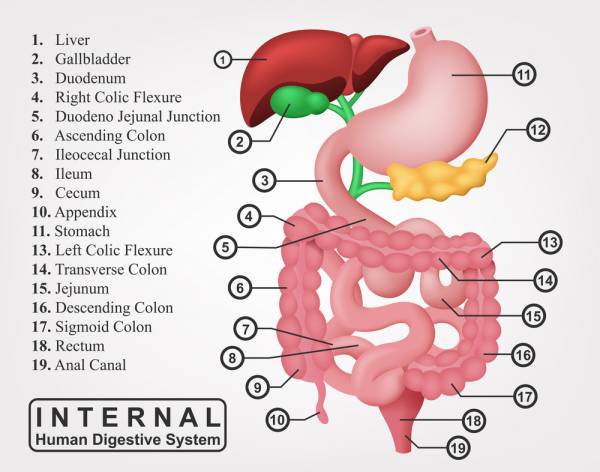How is your digestion? Think about it for a moment. If you’re like nine out of ten people, you probably haven’t really thought about it before. So ask yourself:
- How does it feel in your gut?
- Before and after your meals?
- Is constipation, bloating, or nausea common?
- Are there particular foods that don’t settle?
- Do you walk around often tired despite having slept seven to nine hours most nights?
- How much water do you drink a day?
- How often do you poop and what does it look like?
These are all things to assess when considering your digestion.
The Essential Function of Digestion
According to the U.S. Dept. of Health and Human Services, digestive disorders affect sixty to seventy million people in the United States. These disorders may include GERD, irritable bowel syndrome, constipation, gallstones, hypochlorhydria, and leaky gut. Not to mention, indigestion, bloating, constipation, nausea, stomach pains, and more. In other words, if you experience less than optimal digestion, you are not alone.
And if your digestion is not spot on, it could be impacting your performance and results in the gym. Digestion is an essential aspect to training at your optimal function.
Since 99% of your nutrient assimilation occurs through food moving through your digestive system, if your digestive system is not functioning optimally, then your nutrient uptake is not optimal either. All the vitamins, minerals, proteins, carbohydrates, fatty acids, and supplements you ingest are not being used to their fullest potential for energy, recovery, muscle growth and repair.
“Digestion is an essential aspect to training at your optimal function.”
Whether your goal is to make it to the CrossFit Games, compete in a triathlon, or simply to look good naked and keep up with the grandkids, a look inward can do wonders for your performance outward.
You don’t have to struggle with poor digestion forever. In fact, there are a few key steps you can do at home, today, to improve it and begin to experience more energy, new performance gains, and better absorption than before.
Here are a few triggers that can make digestion go wrong, and some simple ways for turning things around.
Stress
Stress hurts for many reasons – digestion included. Since digestion begins first and foremost in our brains, and the brain is also where stress reiterates from, when our brains are stressed, then our digestion can become stressed.
You know how it works: we are on the go, in our cars, or at our desks working, shoveling our food in quickly between appointments, meetings or other to-dos. We don’t take the time to sit down or sit still to allow the process of digestion to really begin and settle. Consequently, digestion takes a punch.

Our bodies are wired to digest and eat in a parasympathetic state, i.e. not when we are running from a bear, but when we are relaxed. You’ve already lost the battle if you practice stressful eating habits. So, slow down, and enjoy the sights, smells, and sounds as you sauté your veggies or cook up your burger.
Chew, Chew, Swallow
The digestive process begins in the mouth as your saliva assists in food transport and breakdown. But more often than not, due to our on-the-go lifestyles or improper habits around food consumption, we don’t chew enough.
This poor chewing contributes to the poor formation of a bolus (thoroughly chewed food to be transported to the stomach). When our food is not properly chewed, then our stomach and intestines are going to struggle with having to break down our food more than they’re designed to.
“Our bodies are wired to digest and eat in a parasympathetic state, i.e. not when we are running from a bear, but when we are relaxed.”
Put your fork down between bites, and chew your food until you can no longer tell what it formerly was. A piece of chicken should still taste like chicken, but look like a wad of saliva-glazed meat after you’re finished chewing. Who knows, your kids might enjoy it if the whole family holds each other accountable on this one.
Low Stomach Acid
The optimal pH (acidity level) of your stomach is 1.5-3 for digestion, i.e. highly acidic, particularly when it comes to dealing with proteins. A nutritional therapy practitioner, integrative medicine professional, or gastrointestinal doctor can help guide you into determining the acidity of your stomach.
Probiotics and digestive enzymes are some digestive supports that give many people a leg up when it comes to a healthy gut flora and enzyme production for the breakdown and assimilation of your nutrients. Some great options for probiotics are Jarro-dophilus EPS, Prescript-Assist, and TransFormation Enzymes Probiotic. Transformation also makes a great product called Digest and Biotics Research’s Intezyme Forte is a great post-meal supplement.

Leaky Gut Syndrome and Dysbiosis
When food is not fully digested, instead of being seen as a nourishing nutrient, it is seen as a foreign invader and the body has an autoimmune response. As a result, the flow of digestion can be disrupted, resulting in things like IBS, constipation, and bloating. This can happen from repeatedly eating foods that don’t agree with us.
Given that, to begin healing your gut, start with consistency in sticking to a clean diet. Incorporate gut-healing foods like bone broth, fermented vegetables, raw full-fat cultured dairy (yogurt), coconut products, and sprouted seeds (chia, hemp, flaxseed).
“While bars and shakes can have a place in an athlete’s diet, they should not make up the bulk of your nutrition.”
In addition, healthy gut support supplements are a must. The probiotics and enzymes mentioned above can be a great start. In addition, consider L-glutamine (for healing your intestinal lining) and licorice root, which is an adaptogenic herb that helps balance cortisol levels and improves acid production in the stomach.
Poor Food Quality
Many of us are kids of a processed-food generation. Our bodies have been exposed to many chemicals and anti-nutrients that never nourished our body in the first place. Even today, many of us rely on fake sources of food (protein, bars, etc.) with claims that they will make us stronger, fitter, or healthier. In truth, they leave us bloated, constipated, and lacking in satiety.
While bars and shakes can have a place in an athlete’s diet, they should not make up the bulk of your nutrition. Instead, reach for pasture-raised eggs, dark leafy greens, red apples and juicy oranges, or organic grass-fed beef and chicken thighs. Real whole foods from a variety of sources will get you much further on the nutrient train.
Which Change Are You Going to Make?
So if you want to amp up your performance in the gym, try the simple changes I’ve outlined above. It could mean all the difference in your energy, performance, and even gains.
More on digestive health:
- 1 Simple Step Anyone Can Take to Improve Digestion
- Why You Need Indigestible Carbs in Your Diet
- 4 Tips for Healthy Digestion on Summer Vacation
- New On Pulse Beat Fit Today
References:
1. U.S. Department of Health & Human Services. (2014). NIH Publication No. 13–3873.
Photos courtesy of Shutterstock.






